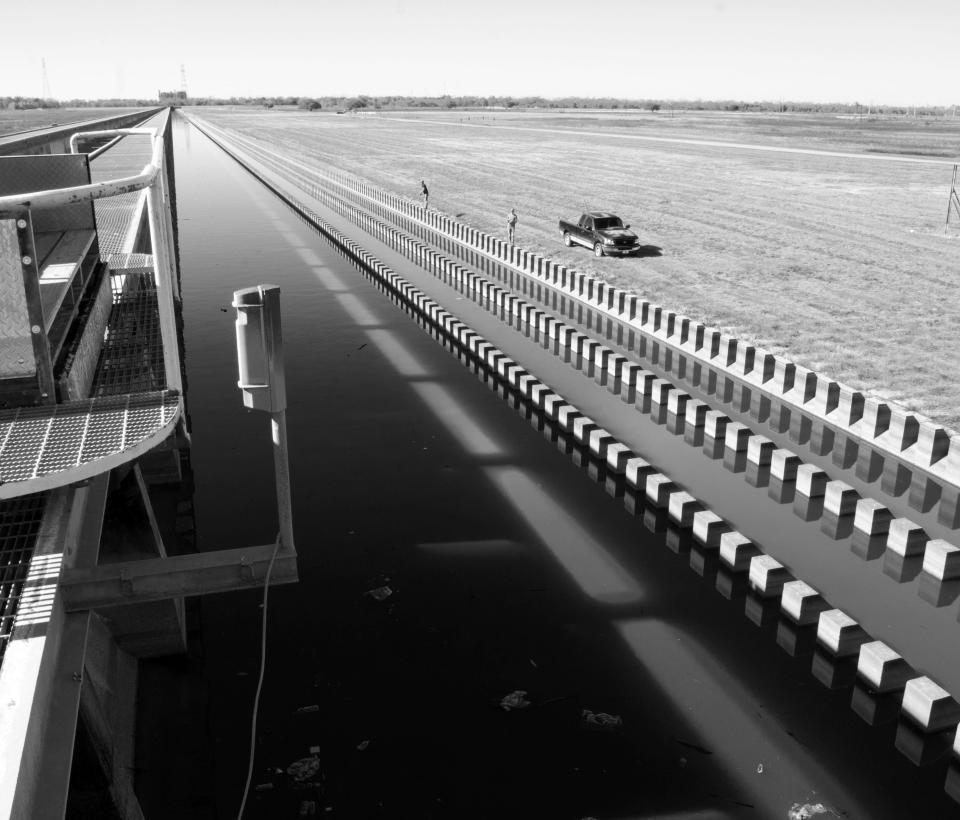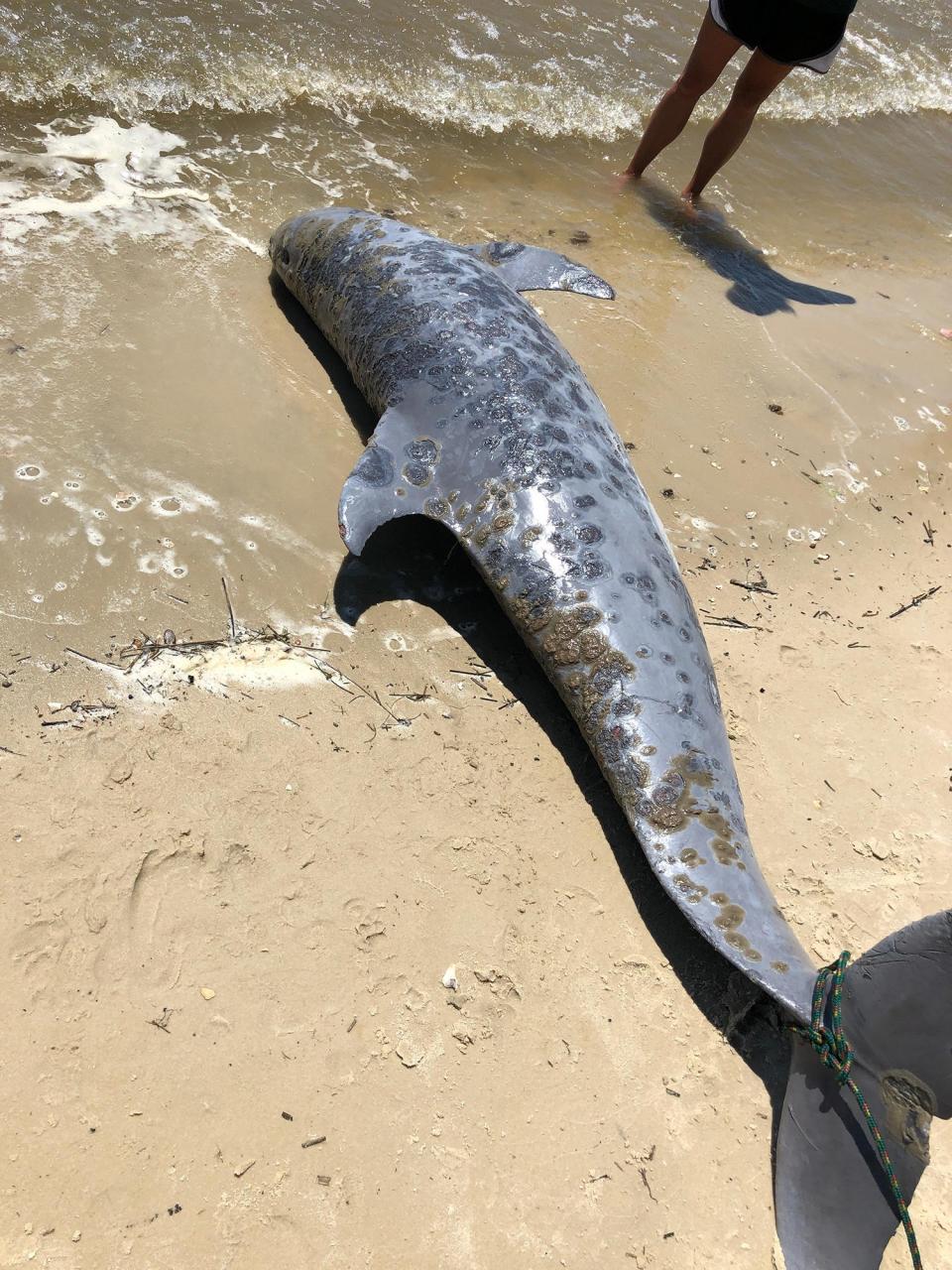Dolphins being killed for flood control, MS lawsuit says. Army Corps accused of violations
The Mississippi Sound’s treasured dolphins need to be protected from the U.S. Army Corps of Engineers’ prolonged and repeated openings of the Bonnet Carré Spillway, a coalition of Coast governments and groups say in a second lawsuit filed Monday against the agency.
“The Bonnet Carré Spillway is killing our dolphins and other marine life,” Mississippi Sound Coalition manager Gerald Blessey said Monday morning in Gulfport during a news conference announcing the lawsuit. “. . . We must protect our dolphins. This is our home.”
In the federal lawsuit, Mississippi Sound Coalition members accuse the Army Corps of Engineers of violating the Marine Mammal Protection Act when it opened the spillway for a record 123 days in 2019 without seeking a permit federal law requires before a dolphin population is disturbed or harmed.
The National Marine Fisheries Service oversees the extensive permitting process, but the lawsuit says the Army Corps did not seek a permit.
The Corps opened the Bonnet Carré to prevent flooding in and around New Orleans. The Mississippi River flowed through Lake Pontchartrain and eventually into the Mississippi Sound, where it created a fisheries disaster by reducing salinity and polluting the environment.
Great white shark spotted of MS coast: Rare great white shark spotted off the coast of Mississippi

“The massive volumes of polluted fresh water diverted through the Bonnet Carré Spillway and into the Mississippi Sound caused direct and indirect mortality of resident bottlenose dolphins,” the lawsuit says. “Many of the dolphins that did survive developed extremely painful and debilitating skin lesions. “
The number of dolphins in the Mississippi Sound was estimated at 1,265 in 2018. In 2019, 166 dolphins washed up on Mississippi shores, either dead or unable to return to the water, the lawsuit says. It was the highest number ever recorded, the lawsuit says, with the second-highest number recorded in 2011, when 147 dolphins were stranded during another flood year with high levels of river water pouring through the spillway.
At the news conference, Moby Solangi of the Institute for Marine Mammal Studies in Gulfport, said 153 dolphins died on Mississippi shores in 2019, compared to 91 during the 2010 BP oil spill. Additionally, 50% of stranded dolphins in Mississippi exhibited painful lesions “caused by extended freshwater exposure,” the lawsuit says. Lesions were observed in only 10% of stranded Alabama dolphins and 7% of Florida dolphins.
Dolphins are integral to the Coast’s economy, ecology and culture, the lawsuit says. The parties who filed the lawsuit, including the cities of Biloxi, D’Iberville and Pass Christian, Harrison County, the Mississippi Hotel and Lodging Association and Mississippi Commercial Fisheries United Inc., want a federal judge to declare the Corps’ failure to seek a permit for taking dolphins “unlawful” or “unreasonably delayed” when the Bonnet Carré was opened.

The lawsuit also asks that the judge order the Corps to comply with the Marine Mammal Protection Act by applying for a permit to take dolphins before opening the spillway, require the Corps to avoid harming or killing the Sound’s dolphin population during future spillway openings, and award attorneys’ fees and court costs to the Coast group.
“The Corps retains discretion to control the volume of discharges through the Bonnet Carre Spillway in a reasonable manner,” the lawsuit says. Further, the Mississippi groups maintain, the Corps could reduce its use of the spillway through “long-term planning and construction.”
The Corps has not yet had time to respond to the lawsuit. A previous lawsuit filed by Mississippi Sound Coalition members accused the Army Corps of violating federal law by opening the spillway more frequently in recent years without considering the consequences to marine life or seeking less harmful alternatives to alleviate river flooding.
In that case, U.S. District Judge Louis Guirola Jr. ruled the Corps must follow federal law by consulting the National Marine Fisheries Service before opening the Bonnet Carré again.
This article originally appeared on Mississippi Clarion Ledger: MS lawsuit accuses Army Corps of killing dolphins for flood control

